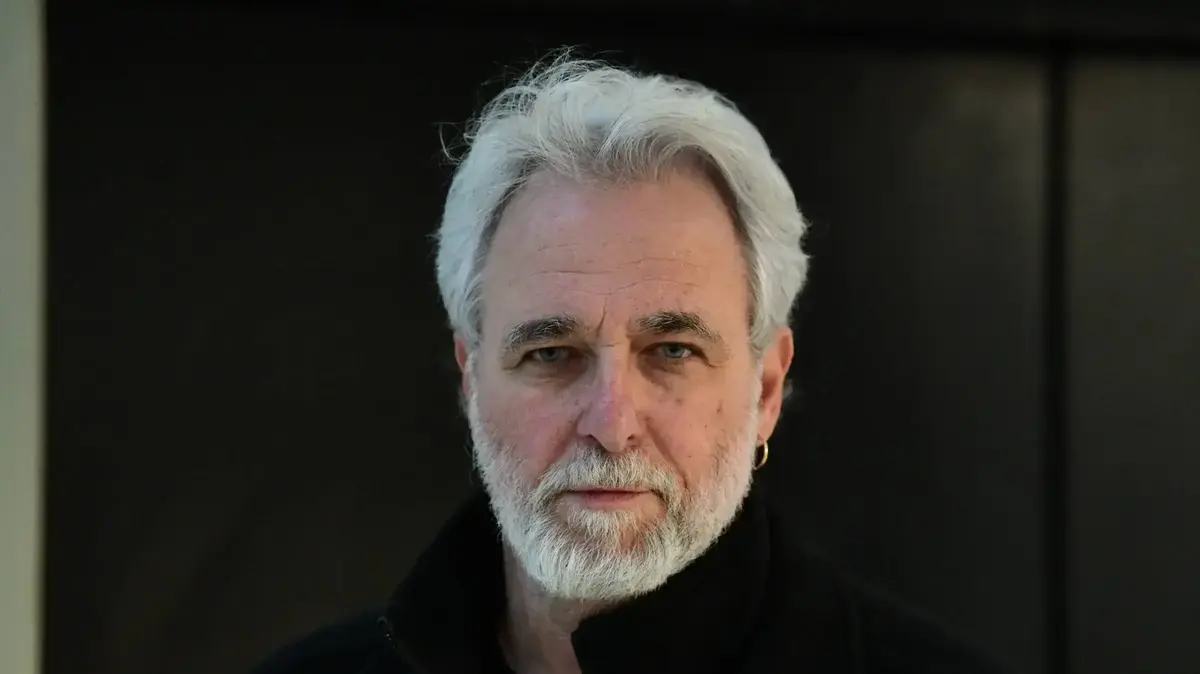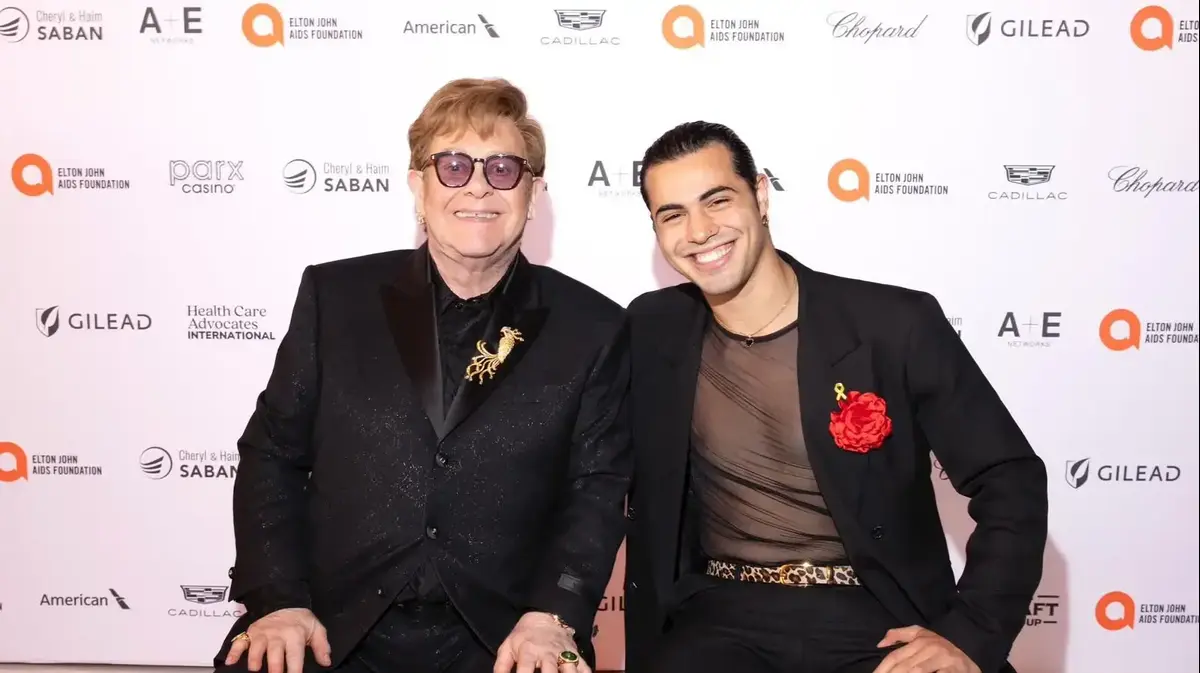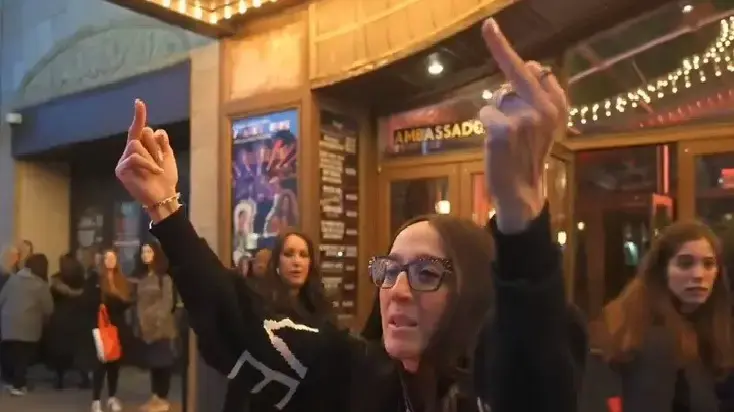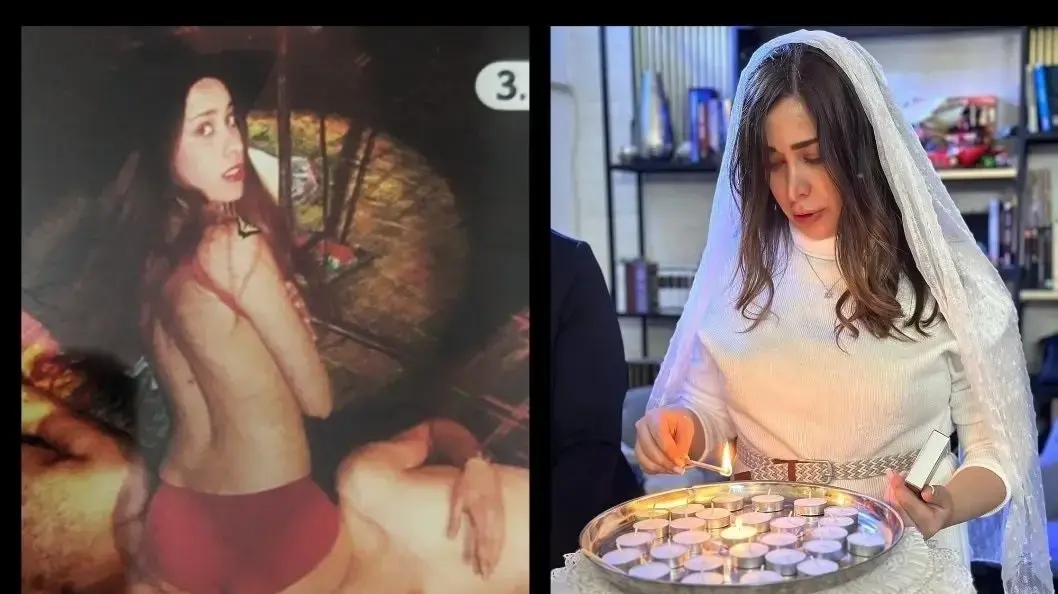The ballad about Ari and Anna
The release of "Where's Anne Frank" was the private Independence Day of Ari Pullman, who worked on it for almost a decade and thought it would never end.
In the interview, he tells for the first time how he wept bitterly at the premiere and what Anna would say about the Lebanon war
Avner Shavit
09/05/2022
Monday, 09 May 2022, 00:00
Share on Facebook
Share on WhatsApp
Share on Twitter
Share on Email
Share on general
Comments
Comments
Ari Pullman's parents were sent to camps that week as Anne Frank.
Throughout his childhood and later in life, he grew up on horror stories from the Holocaust.
"Things I should not have heard, at too young an age," he said of it.
For years he also tried to stay away from the tragic story of the girl who did not survive the horror, but now the circle has closed - this past weekend "Where is Anne Frank" by him, based freely on the most famous diary from the period.
The film premiered as part of the official selection of the Cannes Film Festival about a year ago, and its distribution with us was delayed due to the corona.
Eventually, he came up here on National Independence Day, and Pullman defines his rise today as his independence from this production, on which he worked for nearly a decade.
"I went through a lot of things in my professional life," he says in an interview with Walla!
Culture, "but nothing was close to what I went through with this film. At the end of watching it, my mother told me it was charming and beautiful, but then she added - 'His work took you twice as long from the Holocaust itself, so after so much investment, it would have been better. A successful film is coming out. "
At this point, Pullman opens his heart and tells us something he has not told in previous interviews with him.
"The first private screening of the film was by year, in a cinema in Paris. I sat there with the French producers and distributors, and at one point I just started crying, and they left the hall and left me alone. I sat there alone for twenty minutes until I left. I could not believe I saw this film. "I just did not believe it was happening."
This is the movie that Anne Frank deserved: our full review of the movie
A year after its Cannes premiere, the film went up in the country.
Ari Pullman on the Riviera (Photo: GettyImages, Andreas Renz)
On the face of it, the procrastination around the film is surprising.
After all, the entertainment industry loves Holocaust stories, and Anne Frank is the greatest Holocaust icon of all.
In addition, thanks to "Waltz with Bashir", Pullman became the best-known and most respected Israeli filmmaker in the world.
In light of all this, it could be assumed that producing the project would be relatively easy, as much as something could be easy nowadays.
"I thought the production of the film would take four years. In the end it took more than twice that," Pullman says.
"I thought it would take me a reasonable amount of time to get him funding. I was deceived. This thought turned out to be complete nonsense. I could not have imagined the production would be so difficult, but I could no longer get out of it. Mine grew up in this story, they are not so familiar with reality without having this project in the background. "
The project had a hard time spreading wings, because it is a rare chicken in the sky.
With a budget of about twenty million euros, it is one of the most expensive films ever made by an Israeli director.
In addition, it is an animated film that appeals to both children and adults, without talking animals and with complex and sensitive content, which is also unusual in the landscape.
At one point, when he failed to complete the required funding, Pullman stopped and together with David Polonsky created a graphic novel about Anne Frank's diary.
The result was exemplary, translated into 26 languages and sold 1.8 million copies.
"That's what convinced producers and distributors that there might be something here, and then the film started to move," says the director.
The graphic novel was based directly on the original diary, and added nothing to it.
The film is not like that.
First of all, his protagonist is not Anne Frank, but Kitty, who was her imaginary friend.
With a budget of about 20 million euros, this is one of the most expensive films made by an Israeli director.
From "Where's Anne Frank" (Photo: Bridget Pullman Movie Gang)
Kitty comes to life in contemporary reality, and as befits the name of the film asks where Anne Frank is.
The answer is - everywhere and nowhere.
The world has made her a universal symbol, but the cult of her character focuses on her beautiful words and the emotional catharsis her story offers, ignoring what her true commandment was.
Her moral will was that everything was done to take care of the well-being of every boy and girl in the world, and needless to say, humanity preferred to skip this part of its diary.
Next, under the noses of visitors to the Anne Frank House, a distressed girl, a member of an African refugee family that the authorities are about to deport, walks the streets of Amsterdam.
Kitty meets her, and as befits a moral compass, decides to act immediately.
She takes the sacred diary hostage until the world sobers up and decides to act on Anne Frank's true legacy, and prevent deportation.
There were those who were quick to pull out the "no comparison" card and claim that Pullman compares the Holocaust and the refugee crisis here.
This is not true - it is merely conducted in accordance with the humanist agenda of Anne Frank, in whose diary she wrote not only about her and her family's particular situation, but also about humanity and history in a broad perspective;
And of her father Otto, who used the diary sales profits to advance humanitarian causes around the world.
The director addressed this immediately after the film premiered, at his official press conference held at the Cannes Film Festival.
"God forbid I will not use the term 'comparison', he clarified in response to a question from a Dutch journalist."
You have a very important task as journalists - to make it clear that there is no comparison and that there is no comparison here, otherwise they will take it to the wrong place.
How do you compare genocide to something else?
I myself am a son of Holocaust survivors, why should I compare her to something that is happening now.
I will never do that. "
What the world has lost.
Anne Frank as a mature woman in Pullman's graphic novel based on her diary (Photo: From Anne Frank The Graphic Diary)
"For me, 'Where's Anne Frank' is not a Holocaust film. 'Schindler's List', 'Son of Saul' and 'The Pianist' - yes Holocaust films. This film? No. Forty percent of it happens during the war, but I can not see it. A Holocaust movie. It's a teenage movie of two girls "
The Anne Frank Foundation is the one that approached Pullman to make a film based on the diary, which has already won a variety of film adaptations, the first and most famous of which came out only a few years after the publication of the original text.
"If they had told me to do a direct processing of the diary, I would not have done it," Pullman says.
"They told me 'do something completely free,' and that's the only reason I agreed. What do we need to do more processing of the diary for? Who needs it?"
"My biggest dilemma while doing it was a simple question - why? Why should I make a film about the Holocaust? It's so powerful in my life, why should I bother with it anymore? I asked myself what else can I tell."
If you could ask Anne Frank one question while doing it, what would you ask?
"I would ask her if she would even make the film. She would say that her imaginary world is even more colorful than the film. I don't think she would have connected to animation in the first place. She adored Hollywood movies with stars and flesh and blood stars. For her, animation is for children."
At what age do you think you can see the film?
"Nine, ten. For me, this is first and foremost a film for children. It comes out in Israel in an English version and a Hebrew version, and I mainly promote it. The dubbing is a league. Please mention the work done by the dubbing director Sharon Cohen."
What would you say to a parent who would say, "Why should I take my child to a Holocaust movie now? It's heavy."
"What's heavy? It's not heavy. The film illustrates that Anna was a complex and round personality. She was so smart and talented. She was funny on levels, and sometimes a little clumsy. She knew how to recognize all the weaknesses of adults, and get into them. This film brings her as "She was a girl with unfulfilled dreams, thoughts and loves. The content itself is a classic content of adolescence. Yes, there is probably death here as well, but we used Greek mythology to find a creative solution to that as well."
"For me, 'Where's Anne Frank' is not a Holocaust film. 'Schindler's List', 'Son of Saul' and 'The Pianist' - yes Holocaust films. This film? No. Forty percent of it happens during the war, but I can not see it. "A Holocaust film. It's a teenage film of two girls. It's a film about their relationship and Anna's relationship with the world, with her family and her life in hiding, when she has to share a small room with a dentist much older than her."
Trailer for the movie "Where's Anne Frank" (Cannes Film Festival)
What did your kids say about the movie?
"What do you mean what did they say about the film? They're part of the film. They've been my advisors all along. I consulted with them as a screenwriter about everything, and my daughter came up with one of the main plot solutions. I got a lot of teasing from them, but it was fun."
In a sense, "Where's Anne Frank" is closing a circle.
Your first film, "St. Clara," which you directed with Uri Sivan, also dealt with adolescence.
But then you were young guys who came out of the film department, and now you're already with gray hair.
"When you make a first film, you are in a struggle with the whole world. I struggled then with people who are my age today. Lucky I had Uri by my side, because the world saw me as nothing more than a little boy."
"In our first film, everything we shot - came in, except maybe a whip of Yevgenia Dudina making jam. When you make a second and third and fourth and fifth film, the expectations and conditions are different. ".
"Where's Anne Frank" also had quite a bit of editing, including at the script stage.
We will not tell of course what happens in the end, but it is said that he originally had a different ending.
"As part of Anne Frank's legacy, there were many girls in war zones who were compared to her. During the siege of Serbia in Bosnia, there was a girl who was nicknamed 'Bosnian Anne Frank,'" Pullman said.
"Every day she uploaded a diary page to the internet. One day a helicopter landed in her village and took her to Paris. We interviewed her there for TV and asked her at the end 'what will happen to you'? And she replied 'I will die like Anne Frank'. They said 'okay, well done'. And flew her back to the village.
"Inspired by this shocking story, I wrote a final act that has a reality game, 'Who will be the next Anne Frank?'
Girls are flown from war zones and then returned to the battlefield. When the French distributor heard this, he said to me, 'Are you crazy? If you write it like that, the movie will never happen.'
"They saw me as a little boy. I struggled all over the world."
Ari Folman (Photo: Reuven Castro)
Your most famous film, "Waltz with Bashir", is based on your experiences from the war in Lebanon, which we will very soon mark forty years since its inception.
What would Anna say about this war?
"That she's pointless. That's what she would say about any war. What do you say when you see the war in Ukraine? Anna would ask how the world did not learn.
" In the original text, Anna talks about the stupidity about the wars, about the pointlessness.
Her important sentences are not all kinds of optimistic Sheffer sayings, but reflections on the adult world, which with all its intellect invests all its resources to produce a
weapon that kills peoples. "
"It's not interesting. To come and look today for who betrayed her - it's not interesting. At first it bothered me too, and I even thought it would be part of the film, but I realized there was no point in it. There are so many possible suspects. So many directions. So many "Warehouse workers who may have been connected to it. It's just blaming the darkness."
How is it that the film has no distribution in Germany?
"This is the only place in the world where we have no distributor. The Germans have more knowledge about the Holocaust than anyone else, but emotionally they treat it as if you are opening a chapter in the Torah and reading about an injustice the Israelites did to the Moabites. They have no emotional connection. "We are innocent of it ourselves, so to criticize only the Germans - that is also not true."
You know that the first time the show according to the diary went up in Germany, a German woman sat in the audience and cried "at least this Jewish girl should have been saved."
"Wow, what a crazy sentence. A sentence that totally perpetuates race theory,
"Her important sentences are not optimistic boosters, but about the stupidity about the wars."
Anne Frank (Photo: Reuters)
Do you think that in fifty years' time we will continue to talk about Anne Frank and the Holocaust?
"There is no debate about Anne Frank. She is an eternal icon. About the Holocaust? I'm not sure."
This does not contradict?
"No. Anna is not a Jewish icon. She is a universal icon. Until ten years ago, Anne Frank was not even mentioned at home as a Jew. She is an icon of a girl who went to war, wrote an amazing diary and stopped writing it, without writing why she stopped and what happened in the seven months. "The last of her life. Bone Avner, let's not make this interview a depressing talk to the death about the Holocaust."
Okay, so you can ask about the farce joke in the movie?
I know it appears in the original diary as well, but why did you use it?
"It was original, it suited the animation, and it expresses the being of the house. I didn't think about it twice."
As in your previous films, here too the soundtrack plays a major role, this time written by Keren or;
And Ben Goldwasser, half of the MGMT duo.
"I'm generally very sensitive to sound, and attach a lot of importance to music. Why is it called cinema? Sound is as important as movement. In many animated films, you get the soundtrack at the end, when the budget runs out and it has no money. I work on the soundtrack from the beginning. "The work itself, and not just the end of the editing. Max Richter wrote the soundtrack for 'Waltz with Bashir' and 'The Futurists' Conference' even before we started working on the animation, and so it was with Keren and Ben this time as well. They entered the process very early."
Eternal Icon.
From "Where's Anne Frank" (Photo: Bridget Pullman Movie Gang)
When you started making movies, did you imagine that one day there would be three full-length animated films behind you?
"I did not imagine anything, I just wanted to make films, that's the only thing I wanted. Life took me in that direction, and in animation I found something that suits me very well. When you make a non - animated film, there is always a dilemma how far you can go. In animation there is not that. She "Blurs the boundaries between reality and imagination and you can go as far as you want. This is a language that I am very comfortable with."
Even with interviews already comfortable for you?
"It's very difficult for me, certainly when it's around the Holocaust. I have a hard time with the exposure. When I have an article on TV, I will go to the sea, and I will not read talkbacks. It is best to stay away."
culture
Theater
Cinema News
Tags
Anna Frank
Where's Anne Frank?
Ari Pullman
Waltz with Bashir















